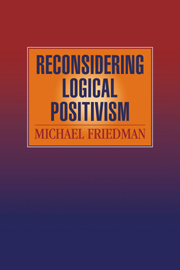PREFACE
Published online by Cambridge University Press: 05 June 2012
Summary
Logical positivism is one of the central strands in the fabric of twentieth-century thought. Originating in Austria and Germany in the 1920s, during the exuberant “modernism” of the Weimar period, it was intimately intertwined with some of the most important scientific developments of the new century: in particular, with the development and propagation of Einsteinian relativity theory and with the great debates on the foundations of mathematics that culminated in Gödel's celebrated incompleteness theorems. Indeed, Einstein was on close terms with several of the leading members of the logical positivist movement – with Moritz Schlick, the founder and guiding spirit of the Vienna Circle, and Hans Reichenbach, the leader of the Berlin Society for Empirical Philosophy – and Gödel was himself a part-time participant in the Vienna Circle. Logical positivism also was actively involved with the revolutionary sociocultural and political struggles of the period and, in particular, with the movement for a neue Sachlichkeit in both society and the arts typified by the Dessau Bauhaus. Otto Neurath, a second leading member of the Vienna Circle, was especially involved with these struggles: he represented a scientifically oriented version of Austro-Marxism and even served as minister of economics in the short-lived Bavarian Soviet Republic in 1919. The logical positivist movement thus was not only identified with Einsteinian physics and modern abstract mathematics, but also with socialism, internationalism, and “red Vienna.”
- Type
- Chapter
- Information
- Reconsidering Logical Positivism , pp. xi - xxPublisher: Cambridge University PressPrint publication year: 1999

